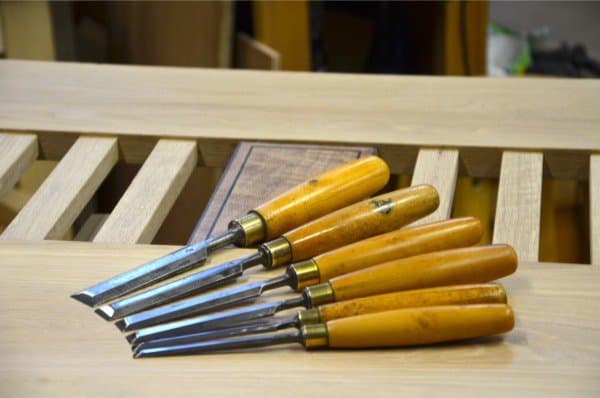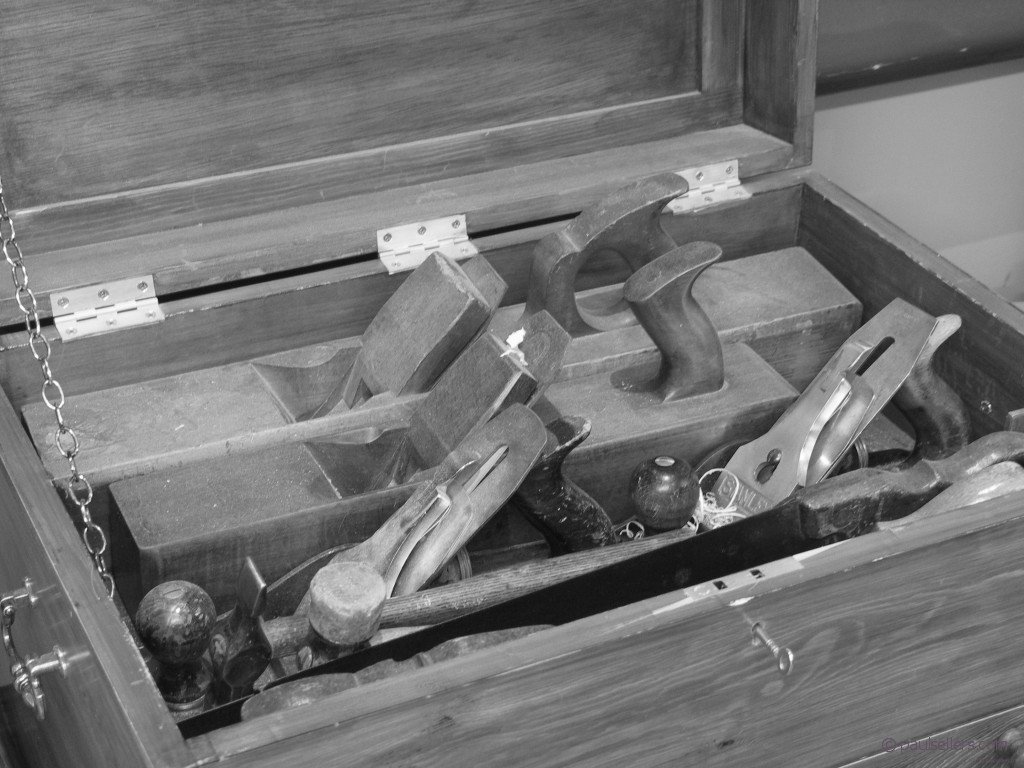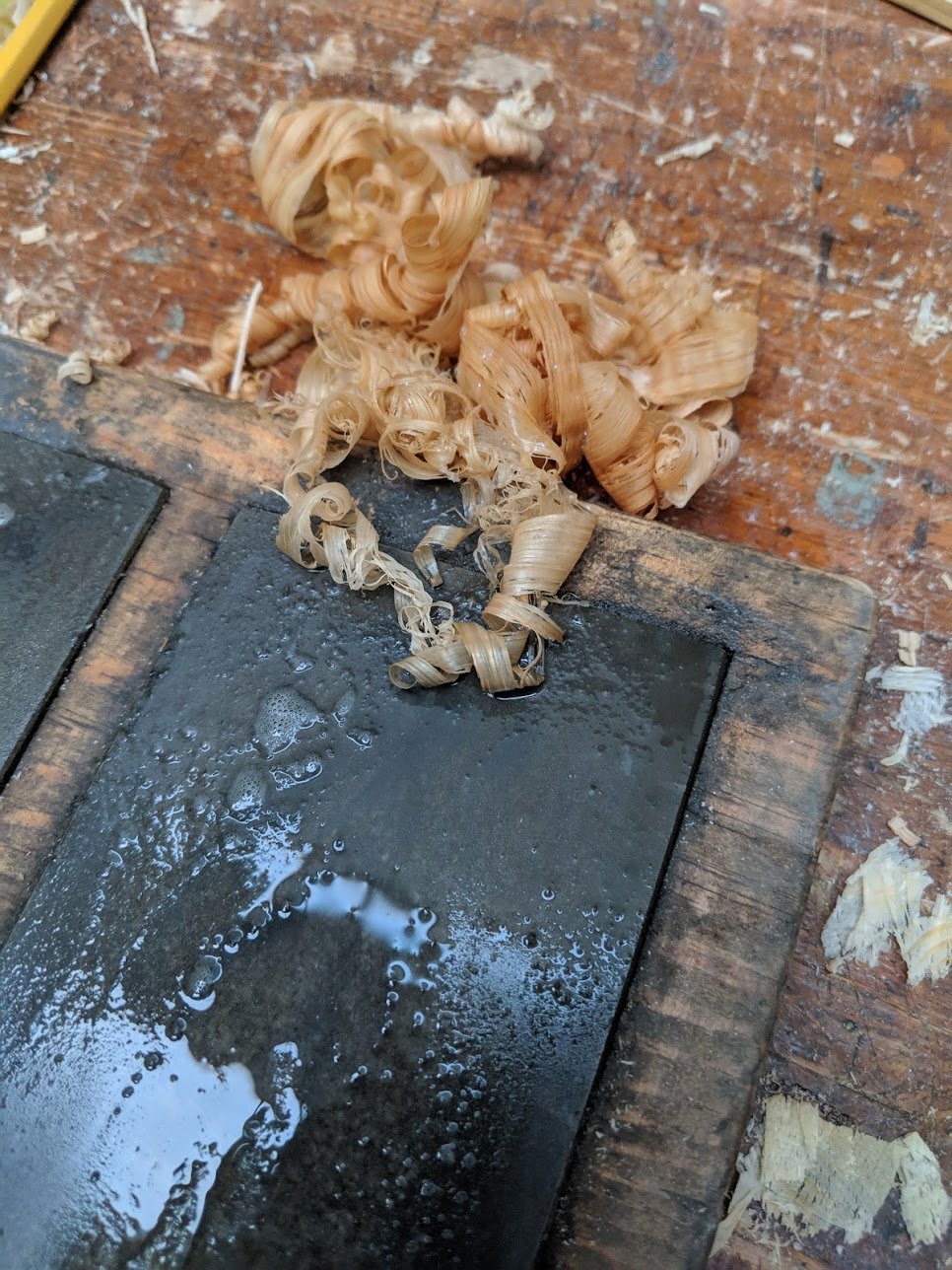George and I
It was 5.30 Friday evening when George and I finished the big ritual of sharpening all of our tools. Planes, saws, chisels and spokeshaves were lined up with bright shiny cutting edges ready for our return to work the next Tuesday morning. George was a happy man when all the tools were in order, I could tell. This habit above all else was, well, so established for all that each man did the same religiously, but this particular evening all the men were in a similar frame of mind. This weekend was the Spring bank holiday in front of us and the men had spent time that week preparing for their family trips to the seaside or to the countryside a two or three hour drive away. I remember the sense of freedom weekends brought post war because some of the men knew life before that time and spoke of it with a mixture of warm camaraderie and extreme sadness and loss. It was the simple act of cleaning together that somehow seemed so cathartic. Reestablishing order showed the preparedness they all valued and which they had all learned from being in the military. The importance of self discipline was ever evident even in those who had known no war but it permeated because of the men who had. 

My early training at home prepared me for these Friday clean ups. They thoroughly took care of all areas and brought order to the workshop generally and specific areas around each workbench where all feared to tread except the occupant of said bench. With the wood racks in order and components for batch runs all palletised, neatness seemed to fall on all things. With this done the men turned to their bench tools and everything with an edge or point would get sharpened with a file of one kind or another or an oilstone. There was nothing prissy about this next hour. No discussions on honing angles or micro bevels, diamonds versus Japanese water stones or the difference between an Arkansas or a Washita. Each man had his preference and went to the task. All the tools were as sharp as one another’s and no man picked up a dull tool when work resumed the following workday.
Being still the baby in the group I acted as though confident at sharpening but George helped me to understand my place by asking to see my results at the stone. “Back you go and start again.” he’d say, but with a smile stretching out his cleft chin. I did. There was no question of not subjecting my efforts to his critical eye. This was how I grew. He was an honest man that supported me. Never mean spirited, he trained me so as not to exasperate me, My father was that man too. These examples counter those given by others we seem to encounter every so often when we are young and in training. Insecure men, that’s all. It’s not a bad thing to have the occasional contrast kindliness.
We all used oilstones of one kind or another back then as I said. The older men used natural stones, which were much more expensive and harder to get hold of whereas we younger ones generally relied on man-made combination stones made from carborundum. We all enjoyed the bantering back and forth as we prepared for the longer than usual weekend off. It was a more relaxed pace when the shop was fully swept and put in order. The bosses were all gone an hour before and just the workers left to go home.
I liked this Friday ritual, it’s something I have always enjoyed and still kept up with today. George and I had been making some mahogany drawers. The drawer fronts lay on the benchtop and I left my oilstone without its cover on which I never did normally. Unaware that a few shavings lying around my less resolved bench top area I didn’t give things a second thought as we all closed the day, grabbed our lunch sacks and left for the weekend.
It was Tuesday morning when I returned to work. George often arrived before me and this morning, expecting his usual smile to greet me, George had a very black look on his face. Knowing something was not right he nodded towards the oilstone. At first I didn’t see anything untoward. He lifted the shavings which were now sodden with oil. Then he lifted the very dark and splotchy mahogany drawer fronts we had completed with half lap dovetails the Friday before. The machine oil had wicked along the shavings to the drawer fronts and I knew I was in trouble big time. With the dovetails cut and fitted, nothing could be done but to replace them. My week started badly. I was exasperated and rightly so.


I would be willing to bet you NEVER recreated that learning experience again. I personally never make a mistake but I do have painful learning experiences.
It must be lovely to “never make a mistake” 😀
I, daily, look left and right for a hole to crawl into for things such as this.
Thanks Paul. Wonderful post. Sadly, my first job after school doesn’t have such warm memories. I didn’t have anyone take me under their wing. I almost left my industry. Since then, whenever someone new to industry has joined I’ve done what George and others did for you. My bad experience ended up in good because I didn’t want anyone new to have such a rough time starting out as I did. In fact, I teach one night a week at my almamater and make it a point in every lecture to spend a few minutes pointing out pitfalls to avoid when new in the workplace.
A question about your diamond sharpening stones and similar:
Do you ever clean them, and if so, how? Every time they are used?
Many thanks for your continuing insights into the practicalities of woodworking.
As for me I prefer to duster my diamond plates every time I sharpen. For the coarse one (extra coarse in my case) I use not only a cloth but also a brush when the plate is dry.
I don’t fuss with mine at all. Using the cheapo auto glass cleaner has worked for me for about 12 years. It is hard to say how long the plates should last because I sharpen many more times than most woodworkers do and students use the same plates I do. I would guess that a new set of the three plates, were I the only user that is, would probably last me 10-20 years. That’s because when the stones get finer through wear/use I simply move them over one place and only really replace the coarse plate. Cycling through this way gives me an ultra fine spare and a decent set for daily use.
My system couldn’t be simpler. I spray each of the plates with the auto glass cleaner before sharpening and then move across from left to right to the final level of super-fine. I then dry the cutting iron or chisel off on a piecer of paper towel. If I have several to do I just keep going until they are all at the same level from the last plate, drying each blade as I go. As soon as that is done I wipe off the plates with the paper towel to remove swarf and moisture. The plates get stowed and then it is time to strop. If I have a lot to do I would use a mechanical grinder with a cloth mop. And I am talking 100-120, generally. This is when I a have class of say 20 students so I might have 2-3 planes, 6 chisels, 2 spokeshaves and a knife per student. For my day to day I stay with the leather hand strop because it is quick, easy and efficient.
How do you know when it is time to shift (cycle) the plates?
Bro. Paul, this posting sounds like it could spark the title of a book of compilations of your blog articles and/or other memories of your apprenticeship and tutelage under George’s watchful eye and guidance (perhaps others as well). I could see a title forming, perhaps, from your relating of this experience: “George and I — My time As A Joiners Apprentice In the Workshop.” Well, perhaps a better title could be propagated from the minds of others here who follow your blog. Best wishes for a new year …!
I do love your reminiscences.
When as an engineering apprentice in 1964 I was given the task of constructing 20 bantem bridges ( a 24″ wide conveyor using 2″x 2″angle iron…formed in a lattice construction and tack welded) at 18yr old I was proud of my work. The welder who had it in for me as I was the bosses son, managed to “accidentally” drop a few so the welds snapped and I had to remake. He walked off with a smug smile….I am 73. and would love to ask him why?
I am sure we all have something similar in our start at work.
I only wish I could have had a “George”
It is sad that these things cloud our pasts. I have some of those in my past too, but never with George. Mostly it was the older apprentices and then one middle aged man who was really skilled as a craftsman but was a spiv by his disreputable dealings too.
Having said that I have many memories of good tradesman
There was “Geoff” he was known as the finger nail doctor, as he had a “special” 1/32″ dial drill kept in an old tobacco tin. Horrible thought but he would gladly show his skills by heating it under a flame whenever a finger nail was smashed by a hammer…..he would then drill through to release blood pressure under the nail.
Or the old boy saying to me “only 50 years to go boy” when I complained my legs were aching after working all day on a concrete floor.
Some people, for reasons known only to them, are silly most are decent.
I love this word – “Spiv.” Not being from the U.K. and the word being brand new to my ears and vocabulary I looked it up of course.
Spiv – In the United Kingdom, the word spiv is slang for a type of petty criminal who deals in illicit, typically black market, goods. The word was particularly used during the Second World War and in the post-war period when many goods were rationed due to shortages.
Brilliant!!
My father was conned by two after the war, he and my uncle, in an attempt to earn a living, started a green grocers round at a time when fruit was still rationed. They met 2 spiv’s in a pub who offered to sell them oranges at a fiver, they coughed up then one stayed with my father in the pub and uncle went off with the other to collect!! When out side and with money in his pocket the spiv said wait here ill get the gear. Uncle waited bloke walked off ( with money) other spiv, in pub said to my father ” wait there mate I’ll see what they are up to! He walked out and ran off!!! A good lesson to my dad and uncle ..don’t trust a spiv…..
Rationing lasted far longer in the UK than the rest of West-Europe after WWII, till the early or even mid-’50s, if I remember correctly. (just checked – it finally ended in july 1954, with meat being the last thing on ration). Even Germany wasn’t rationing by then anymore (doesn’t mean that many things were affordable though).
Have since early childhood enjoyed the British TV-series ‘Dad’s army’, and still watch it regularly. The one character I’ve never liked is that of pvt. Walker, the proverbial spiv. I much prefer the episodes without him in it. I wonder whether the spiv is a typical British phenomenon; I don’t know of a similar thing in my country. (‘zwarthandelaar’, i.e. black-market trader, doesn’t nearly carry all the connotation of what the term ‘spiv’ engenders)
Interestingly, one episode of Dad’s Army deals entirely with three oranges that the green grocer’s has and is auctioning off: ‘For the love of three oranges’. Perhaps the author’s were inspired by your father and uncle. Either that, or oranges must’ve been a real luxury in those days….
I suspect I’m showing my ignorance here, but I was wondering why the welds would have snapped from being dropped? I would have thought that they’d bend before snapping? I have no experience with welding, just a desire to learn (like my desire to learn woodworking!) and a lot of YouTube video watching, so please forgive me if the answer is obvious to someone with your experience,sir.
My questions aside, that sounds like an awfully rotten sort of fellow to have to work with. You may not have had a “George” but I bet *you* were “George” for someone else, sir. 🙂
Hi Luca …I said “weld” rather than go into detail, actually parts are lightly ‘tack’ welded.
Fabrication&assembly from drawings was/is the job of one trade in a workshop then given to a welder. It is practice to lightly ‘tack’ weld when assembling to just hold parts together. The welder then by electric arc welding runs over all tacks to form a strong frame.
A welder does not like big tacks as they form a lump under his neat weld….so tacks tend be weak and can snap.
Ohhh! Of course! I know what tack welds are, I just read “welds snapped” and (foolishly) failed to reread your comment for clarification. You actually stated that the frames were “tack welded together” I guess I just didn’t draw the connection between that statement and the weld snapping bit… maybe I figured you were doing the welding on frames that someone *else* tack-welded together? Who knows, lol.
What a foul thing to do to someone (deliberately dropping the frames you had tacked so you would have to do it again)…a decidedly unpleasant fellow, wasn’t he?
Thanks for your patience, and a happy new year to you!
On my last day at a temporary job at a plywood factory, I broke an expensive piece of equipment. I was near tears as I explained to the foreman that it was not intentional. It was a stupid mistake that an old hand would not have made. This happened about 40 years ago and I will never forget it.
The only reason I had the job was that they believed that I, and my parents, had good character. They needed somebody to fill in during vacation time.
I got the cane more times than I care to remember, then the school sent me to the airforce for work experience, I had the time of my life. When I got back, I was commended by the principle in front of the whole school for being a good ambassador for the school; I never got the cane since.
I love your George stories. Would love to see them in book form, maybe even as an audiobook.
I would love that too! “George and I” would be a great book!
especially in Paul’s voice!
Your George stories remind me of the stories about “The Old Man” by Mark Rashid (horseman).
Looking forward to read more about your apprenticeship.
Sharpening is a rewarding activity. An enjoyable task, once you’ve overcome the initial hurdles, start seeing results in the form of sharp tools, and improvement in your sharpening skills.
About two weeks ago I bought a pair of scissors at a local thrift store, abused, incorrectly sharpened, but of a good German brand and in restorable condition. 0.75 euro poorer I walked out of the store, looking forward to restoring them. Should’ve seen the grin on my face when after about 15 minutes of work the scissors were sharpened and adjusted and cut cloth from pivot to the very tip without balking. Such an improvement in so little time and with so little effort.
Today found two other scissors in the same thrift store; one H.Herder, Solingen, the other one also a (to me unknown) brand from Solingen; again, 0.75 euro/pce. When I tried them out at home it turned out the Herder scissors didn’t need any restoration at all – they cut perfectly from pivot to tip. Drat! Not even a drop of oil needed. I actually felt disappointed, cheated out of an opportunity to sharpen them. Fortunately, the other one needs a little TLC…. Also found a Felco model 4 pruning shears that needs some attention and work done to its cutting edge.
And I think most of us can relate to that sinking feeling you describe once you realize what mistake you’ve made (shavings wicking oil from the stone, into the workpiece). That feeling when you realize you’ve done a very, very dumb thing. I recall restoring a Pentax MX analog camera (1976) about three years ago. Took 6 weeks of work, completely dismantled it and rebuilt it. After shooting the first test roll it turned out to work perfectly except the flash didn’t always fire. Knew it was a bad contact of the switch so decided to use a hand-cranked Megger (high voltage generator…. about 600V, to be exact) to burn the switch contacts clean, without opening the camera. That did the trick… but also destroyed the exposure-meter electronics.
So had to find another old MX and do it all over again. Fortunately, this time it took only two weeks… had all the necessary tools made already, plus some experience of the camera’s insides. Still… when I think back on it I can’t help but be ashamed of having been such a fool and ruined so much work, just because of (basically) laziness.
That’s a wonderful story Paul as it brought back memories (not so fond) of my early days as an apprentice in a cabinet shop. I loved the same ritual with as much passion as you expressed here and while I cannot remember all the perfect pieces of work (at least in my mind) that I did, I will never forget those gut wrenching feeling I got the instant when I knew I had made a mistake – such has the time I hand drilled holes for shelf pins in the wrong location on the inside of a completed walnut book case.
There was the time that my shop boss told me “son, you can get 1000 at-a-boys but its the one “oh sh*t” moment that everyone will remember.” 🙂
‘Tis easy to rule by fear … almost anyone can do that! I grew up with plenty of mean and nasty people around me, and have worked for my fair share of mean and tiny spirited people over the years. I’ll never forget the coaches at school who kept a giant wooden paddle hung up in the gym locker room all year round – it was there to instill a sense of dread and fear in each and every one of us. I did not enjoy my schooling and always thought that not unlike the military it was more about socialization than learning. Thankfully, most all of this taught me NOT to be like these types of people and to try and learn from their mistakes. Thanks for sharing these great stories Mr. Sellers, George sounds like one of a kind.